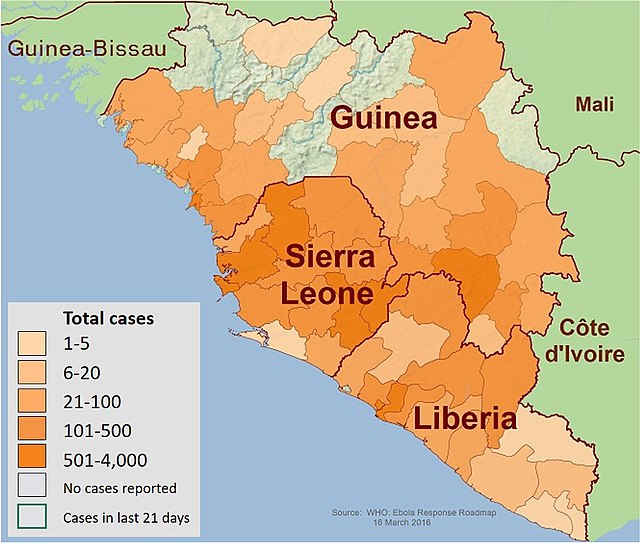 The current Ebola outbreak in West Africa started in late 2013, and as of August 19th there have been 2240 cases and 1229 deaths. The virus is spreading through Guinea, Liberia, Sierra Leone, and Nigeria, and has infected aid workers from the US, UK, Spain, and possibly Germany and India. In response to this ongoing and unprecedented Ebola outbreak, a team of researchers has sequenced and analyzed 99 Ebola virus genomes, providing vital information about the origin and transmission of this outbreak.
The current Ebola outbreak in West Africa started in late 2013, and as of August 19th there have been 2240 cases and 1229 deaths. The virus is spreading through Guinea, Liberia, Sierra Leone, and Nigeria, and has infected aid workers from the US, UK, Spain, and possibly Germany and India. In response to this ongoing and unprecedented Ebola outbreak, a team of researchers has sequenced and analyzed 99 Ebola virus genomes, providing vital information about the origin and transmission of this outbreak.Ebola has an average case fatality rate of 78%. Here is a really great (but somewhat graphic - you've been warned) article about what Ebola does to your body. In a nutshell, it starts out with a fever, sore throat, muscle pains, and headache (a lot like the flu). As the virus progresses, your ravaged immune system releases what is known as a "cytokine storm", where your immune system begins attacking your organs in an attempt to get rid of the virus. This leads to hemorrhagic fever, which causes the infected person to bleed to death. It's some pretty gross stuff, and completely devastating.
This study took samples from 78 confirmed cases in Sierra Leone during the first 24 days of the outbreak. Some of the patients contributed samples more than once, which allowed the researchers to look at genomic changes within viral populations. Viruses are difficult to beat because they reproduce so quickly that the viral populations are able to evolve to overcome treatments. For example, if we look at a person infected with HIV, the viral genome differs by 8% of its sequence when that person dies of AIDS compared to when the person first contracted the virus. That's a huge difference considering that the genomes of humans and chimps differ by 2%! So by sampling some patients twice, the researchers were able to examine how the populations evolve and change over time within one person.
 The researchers combined the Sierra Leone strain sequences with three from Guinea, giving them a dataset of 81 Ebola virus sequences. They found over 300 genetic changes between the 2014 Ebola virus and previously published Ebola virus sequences; it remains unclear whether these changes are the cause of the increased severity of this outbreak. They also found over 50 single nucleotide polymorphisms (SNPs), which are single base mutations in the sequence, between patients in the 2014 outbreak. No changes were found in the viral sequences from patients sampled multiple times.
The researchers combined the Sierra Leone strain sequences with three from Guinea, giving them a dataset of 81 Ebola virus sequences. They found over 300 genetic changes between the 2014 Ebola virus and previously published Ebola virus sequences; it remains unclear whether these changes are the cause of the increased severity of this outbreak. They also found over 50 single nucleotide polymorphisms (SNPs), which are single base mutations in the sequence, between patients in the 2014 outbreak. No changes were found in the viral sequences from patients sampled multiple times.Comparison with older Ebola sequences show that the 2014 outbreak likely spread from Middle Africa within the last 10 years, estimated using the substitution rate to calculate how many years are needed to accumulate the number of mutations found. Since there is very little difference between patients in the 2014 outbreak, this signifies a single transmission - the outbreak started from one person - and no evidence of additional transmission from animals.
The authors released their sequences immediately in order to help global research, and their findings have been made accessible to everyone through open access. The team increased the amount of genomic information on Ebola four-fold, and many of the world's leading epidemiologists are currently working on the data the team has made available since June. Many of the mutations that were found alter protein sequences, and must be monitored in order to effectively target the Ebola virus in the development of treatments and vaccines.
Update (Aug 31, 2014): 5 out of the 50 authors of this study contracted Ebola and died before this paper was published. Their names were Mbalu Fonnie (a midwife and chief nurse for the Lassa fever ward at the Kenema Government Hospital who contracted Ebola while helping a pregnant co-worker); Mohamed Fullah (a lab tech at KGH and instructor at a local college who contracted the virus while working in the laboratory); Sheik Humarr Khan (Director of the Lassa Fever Program for the Ministry of Health and Sanitation, he had treated over 100 patients in the current outbreak); Alice Kovoma (a nurse in the KGH Lassa ward who contracted Ebola from the same patient as Mbalu Fonnie); and Alex Moigboi (also a nurse, who contracted Ebla from the same patient as Mbalu Fonnie and Alice Kovoma). A sixth co-author, Sidiki Saffa, also passed away before the study was published, but not from Ebola. Source.

If you want to help during this ongoing outbreak, here are some organizations to which you can make donations:
http://www.doctorswithoutborders.org/ (or www.msf.ca and www.msf.org.uk for my Canadian and UK readers)
http://www.globalgiving.org/projects/ebola-epidemic-relief-fund/
http://www.directrelief.org/emergency/2014-west-africa-ebola-outbreak/
I have donated $25 to Doctors Without Borders for their Ebola response, they've made it clear that every little bit helps.
No comments:
Post a Comment